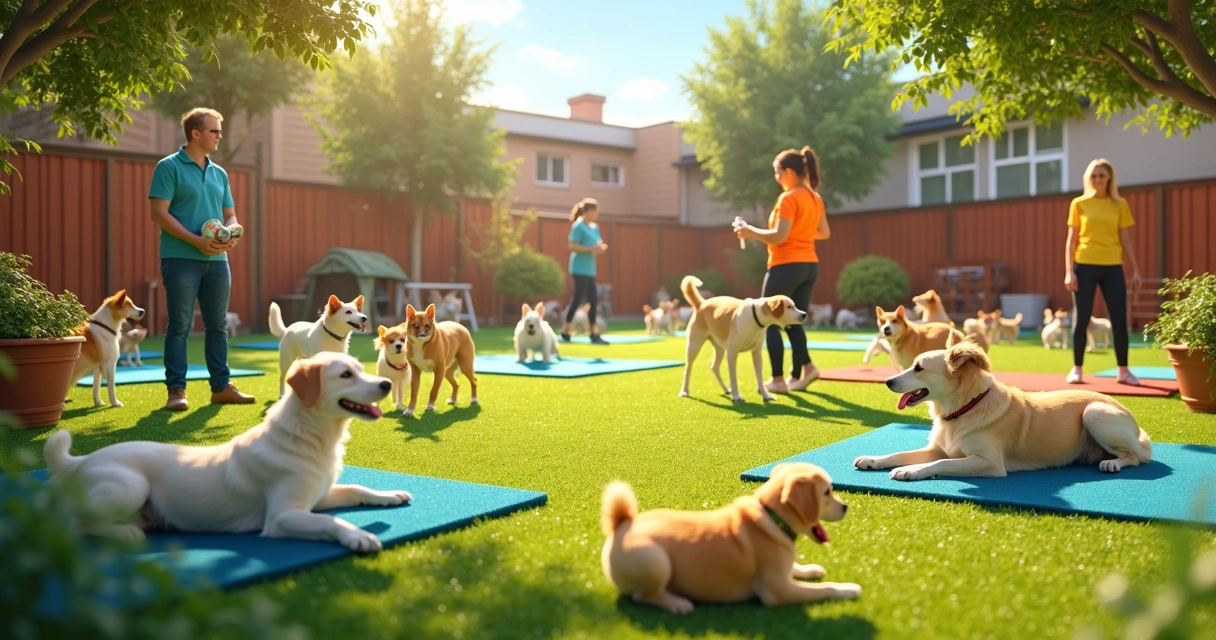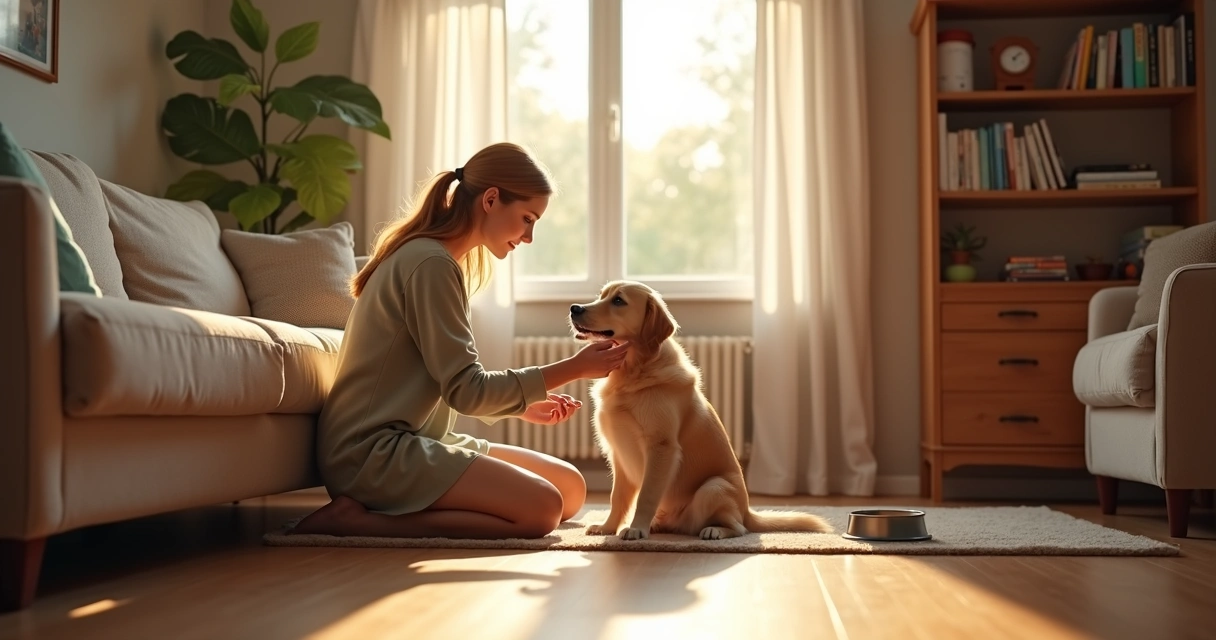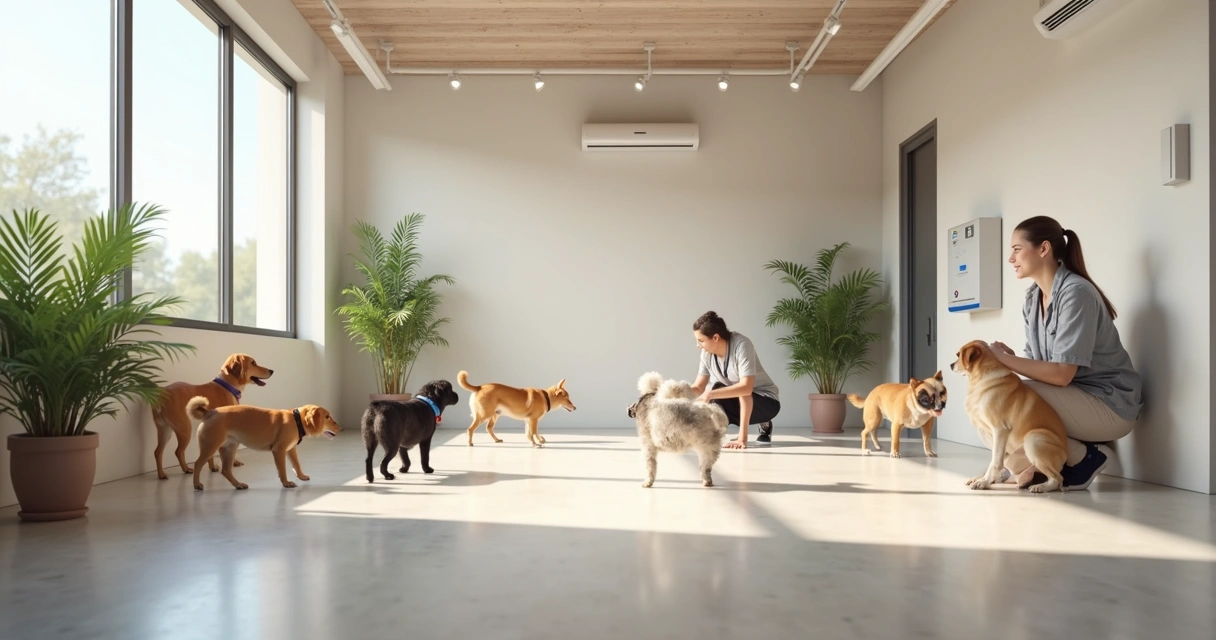If you’re anything like most pet parents, there’s always a moment of hesitation when it’s time to leave your dog for the day. Will he feel lonely at home? Would she be happier around other dogs? Or maybe a pet sitter is the answer. The truth is, there’s no universal option, but both dog daycare and pet sitters offer unique experiences for your pet—and for you, too.
The U.S. pet daycare market is booming, reaching nearly 1.73 billion dollars in 2024. Owners want more: more joy for their dogs, better reassurance for themselves, and sometimes, flexibility above all. Before making your choice, it helps to understand the differences.
What happens at dog daycare?
Dog daycare is more than just a safe space for your pup to hang out while you’re away. It’s a managed experience—activities, play groups, even nap time—designed to keep dogs both mentally and physically engaged. Some days are full of wild energy, with romping and tail-chasing. Other days, there’s plenty of sunbathing and gentle ear scratches. A good dog daycare, like Dogtown in Gloucester, MA, tailors groupings by size and temperament.
Here’s what a typical day might look like:
- Arrival and morning check-in
- Small group play, always supervised
- Midday rest or “quiet time” (think nap-mats or comfy beds)
- More play or gentle activities—maybe puzzle games, casual sniffing walks
- Afternoon snack or feeding if needed
- Owner pick-up, with a quick report of the day's adventures
Dogs thrive on routine and gentle structure.
And it’s not just about dogs. Facilities like Dogtown also serve cats, making it a one-stop solution for household pets. Trust, safety, and experienced staff are at the heart of it all—a fact supported by pet owners who list safety as their top concern.
The best part? You come home to a happy, tired, and well-socialized pet. Or maybe just a dog so pooped she falls asleep, chin on your shoe. That’s a win in anyone’s book.

The pet sitter approach
A pet sitter is exactly what it sounds like—someone who comes to your home (or occasionally brings your dog to theirs) and provides personalized care. This could be as simple as a walk and a meal or as detailed as overnight stays with couch cuddles and bedtime routines.
Dog sitters are in demand, mainly for one simple reason: your pet gets to remain in familiar surroundings. For dogs with anxiety or pets who hate change, a sitter’s consistency is calming. Experts say that the home environment offers soothing routines for anxious dogs.
- Maintains your pet's typical routine
- DIY attention, tailored for one-on-one needs
- No travel or extra packing for your dog or cat
- Updates typically sent via text, photos, or even video
Sometimes comfort is simply staying home.
But pet sitters aren’t one-size-fits-all, either. Finding someone trustworthy can take time. Experience and reliability vary, and while there are thousands of sitters in the U.S., as stats reveal, not every sitter will fit your exact needs. One-on-one attention is a big plus, but it also means pets who love playing with others might get bored.
Pros and cons: dog daycare
Nothing is perfect. Dog daycare can feel like a dream to some dogs and a noisy blur to others. Owners must consider variables like personality, age, and health.
Key benefits of dog daycare:- Supervised play and exercise throughout the day
- Socialization with other dogs and gentle exposure to new people
- Daily feedback on your pet’s well-being, mood, and any unusual behavior
- Convenient access to extras, such as grooming services, dental cleaning, or training classes
- Often located in safe, secure, purpose-built facilities
Daycare services account for about 40% of the pet-sitting market, showing the popularity and trust these facilities have built. But, of course, daycare isn’t ideal for every pet.
Possible drawbacks:- Some dogs may find group settings overwhelming, especially if they’re shy or prone to stress
- Vaccination is usually required—most owners are fine with this, but not everyone
- Prices can be higher compared to hiring a local sitter for check-ins
- Sick or elderly pets might struggle with the higher energy environment
Facilities like Dogtown aim to minimize stress by conducting free pre-enrollment assessments, so dogs end up in groups that really work for them.

Pros and cons: pet sitter
Pet sitters bring a sense of comfort you just can’t replicate. Your pet spends the day in familiar rooms, sniffing familiar smells. But there’s more to the story.
Benefits of using a pet sitter:- Reduces the stress of travel and new environments, especially for anxious pets
- Flexible schedules: sitters can visit as often (or as briefly) as needed
- Personalized care—think special diets, daily medication, or senior pet routines
- Pets are less exposed to contagious illnesses from other animals
- Home appears occupied, sometimes deterring would-be intruders
For some, leaving a beloved dog or cat with someone new feels strange. Trust is everything. Dog-sitting accounts for 83% of the pet-sitting market, showing that many families value one-on-one care. Most sitters are women in their 30s, so if you have a style or demographic in mind, you can often find a match. But there are some disadvantages.
Drawbacks to think about:- Quality can vary—a great sitter is gold, but not always easy to find
- Some pets, especially puppies or outgoing dogs, may miss out on socialization
- Limited access to activities or on-site grooming
- If sitters cancel last minute, you may scramble for a backup
- Additional household privacy or security concerns to weigh
For especially high-energy or socially-driven dogs, the home-alone option just isn't enough. But for others, it's calm and peaceful.
Daycare or pet sitter: which is best?
When choosing between these options, consider your pet’s needs and your own comfort level.
- Young, playful dogs or pets who need loads of exercise? Daycare wins hands down.
- Older dogs who tire easily or have health challenges? A familiar home routine with a sitter may be easier on them.
- Anxious pets or newly adopted dogs? Home is usually best—until their confidence builds.
- Pet parents who want extra services? Look for places like Dogtown that offer grooming, training, or day camp activities during daycare.
- Are you worried about safety or health standards? Choose facilities that require vaccines and transparency in their care, just as three-quarters of pet owners prefer.
Some families even use both options—daycare for high-energy workdays, and a sitter for vacations or elder pets. There’s an art to finding the right mix.
The big picture
As the pet care market grows, with more than 20,000 pet care facilities and 35,000 pet sitters in the U.S., the options for your pet’s care multiply too. Facilities like Dogtown bring together years of experience and specialized group activities, but the right answer depends on your pet.
The best care is the one that fits your pet’s spirit, and your life.
Ready to see your dog thrive in a safe, dynamic, and caring environment? Or maybe you have a cat in need of gentle grooming and personalized attention. Dogtown invites you to schedule a pre-enrollment assessment—discover the joy of a place designed for your pet’s happiness.
Frequently asked questions
What is dog daycare?
Dog daycare is a supervised environment where pets spend time socializing, exercising, and participating in structured activities. Staff manage play groups, rest times, and ensure pets’ safety throughout the day. Facilities like Dogtown provide tailored programs to keep each pet happy and healthy.
What is a pet sitter?
A pet sitter is an individual who cares for your animal in your home, following the routine and needs your pet is accustomed to. Services range from daily check-ins to overnight stays, and often include feeding, walks, and playtime, all within your pet’s familiar setting.
How much does dog daycare cost?
Prices for dog daycare can vary based on location, length of stay, and included services. On average, costs range from $25 to $50 per day, with discounts for package deals or long-term stays. Facilities such as Dogtown offer both single-day rates and multi-day packages for added flexibility.
Is pet sitter better than daycare?
Neither option is universally better. For dogs needing companionship, structured play, and socialization, daycare is often ideal. For pets who thrive on familiar routines, have anxiety, or require one-on-one care, a sitter could be better. The “best” choice depends on your pet’s energy, health, and personality.
Where to find reliable pet sitters?
Many pet owners find reliable sitters through personal recommendations, local community boards, or certified pet care organizations. It’s wise to interview potential sitters, check references, and arrange a trial visit. Consider facilities like Dogtown for additional boarding or care service options.





